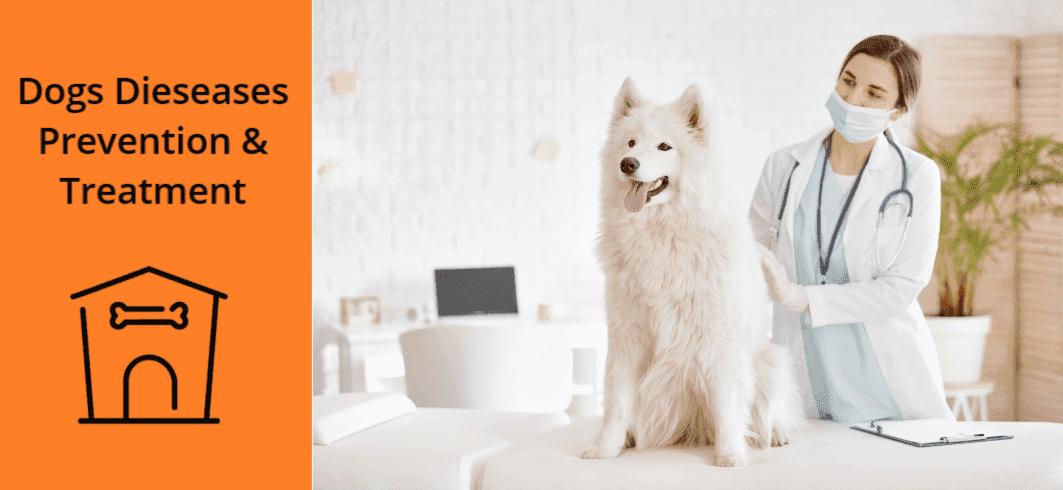Local Storage seems to be disabled in your browser.
For the best experience on our site, be sure to turn on Local Storage in your browser.
Types of common diseases in dogs plus prevention and treatment ways

Types of Common Diseases in Dogs
Dogs are one of the most beloved pets in the world. They are loyal, friendly, and always there to cheer us up. However, just like humans, dogs are also prone to various diseases. As a responsible pet owner, it is important to be aware of the common diseases that can affect our furry friends. In this essay, we will discuss some of the most common diseases in dogs and how to prevent them.
Parvovirus
The first common disease in dogs is Parvovirus. This is a highly contagious virus that attacks the gastrointestinal tract of dogs. Symptoms include vomiting, diarrhea, and dehydration. Parvovirus can be fatal if not treated promptly. The best way to prevent this disease is to ensure that your dog is vaccinated against it. Also, avoid taking your dog to places where there are many other dogs, such as dog parks or kennels.
Lyme
Another common disease in dogs is Lyme disease. This is a bacterial infection that is transmitted through tick bites. Symptoms include fever, lethargy, and joint pain. If left untreated, Lyme disease can cause serious health problems such as kidney failure. To prevent this disease, it is important to check your dog for ticks regularly, especially after spending time outdoors. You can also use tick prevention products such as collars or sprays.
Canine Distemper
Next, we have Canine Distemper. This is a viral disease that attacks the respiratory, gastrointestinal, and nervous systems of dogs. Symptoms include coughing, fever, and seizures. Canine Distemper is highly contagious and can be fatal. The best way to prevent this disease is to ensure that your dog is vaccinated against it. Also, avoid contact with dogs that show symptoms of the disease.
Heartworm
Heartworm disease is also a common disease in dogs. This is a parasitic infection that is transmitted through mosquito bites. Symptoms include coughing, lethargy, and weight loss. If left untreated, heartworm disease can cause serious damage to the heart and lungs. To prevent this disease, it is important to give your dog monthly heartworm prevention medication. You can also reduce the risk of mosquito bites by keeping your dog indoors during peak mosquito hours.
Kennel Cough
Last but not least, we have Kennel Cough. This is a highly contagious respiratory disease that is caused by a combination of viruses and bacteria. Symptoms include coughing, sneezing, and nasal discharge. Kennel Cough is easily spread in places where there are many dogs, such as kennels or dog parks. To prevent this disease, it is important to ensure that your dog is vaccinated against it. Also, avoid taking your dog to places where there are many other dogs.
In conclusion, as a responsible pet owner, it is important to be aware of the common diseases that can affect our furry friends. By taking preventive measures such as vaccinations, regular check-ups, and tick prevention, we can ensure that our dogs stay healthy and happy. Remember, a healthy dog is a happy dog!
Preventing Dog Diseases: Why It's Important
As a dog owner, it's important to understand the risks associated with various diseases that can affect your furry friend. While some illnesses are unavoidable, there are steps you can take to prevent many common dog diseases. By taking a proactive approach to your dog's health, you can help ensure that they live a long and healthy life.
1. Vaccinations
One of the most important steps you can take to prevent dog diseases is to ensure that your pet is up-to-date on their vaccinations. Vaccines can protect your dog from a range of illnesses, including rabies, distemper, and parvovirus. Talk to your veterinarian about which vaccines are necessary for your dog based on their age, breed, and lifestyle.
2. Regular Check-Ups
Regular check-ups with your veterinarian are also crucial for preventing dog diseases. During these visits, your vet can perform a physical exam and run tests to check for any underlying health issues. They can also provide advice on nutrition, exercise, and other aspects of your dog's care.
3. Good Hygiene Practices
Maintaining good hygiene practices is another important way to prevent dog diseases. This includes regular grooming, such as brushing your dog's coat and cleaning their ears. You should also clean up after your dog and dispose of its waste properly to prevent the spread of disease.
4. Proper Nutrition
Proper nutrition is essential for your dog's overall health and can help prevent a range of diseases. Make sure your dog is eating a balanced diet that meets their nutritional needs. Avoid feeding them table scraps or foods that are toxic to dogs, such as chocolate, onions, and grapes.
5. Exercise and Mental Stimulation
Finally, regular exercise and mental stimulation are important for preventing dog diseases. Exercise can help keep your dog at a healthy weight and reduce their risk of developing conditions such as diabetes and heart disease. Mental stimulation, such as playing with toys and training, can also help keep your dog healthy and happy.
In conclusion, preventing dog diseases is essential for ensuring that your furry friend lives a long and healthy life. By following these tips, you can help protect your dog from a range of illnesses and keep them happy and healthy for years to come. Remember to consult with your veterinarian for personalized advice on your dog's health and wellness.
Dogs' Common Diseases and Their Treatment Ways
Dogs are one of the most beloved pets in the world. They are loyal, friendly, and playful. However, like any other living creature, dogs are prone to diseases. In this essay, we will discuss some of the most common diseases that affect dogs and their treatment ways.
Parvovirus
Parvovirus is a highly contagious disease that affects dogs, especially puppies. It is transmitted through contact with infected feces or vomit. Symptoms of parvovirus include vomiting, diarrhea, and loss of appetite. If left untreated, it can lead to dehydration and death. Treatment for parvovirus includes hospitalization, intravenous fluids, and antibiotics.
Heartworm Disease
Heartworm disease is caused by a parasitic worm that is transmitted through mosquito bites. It affects the heart and lungs of dogs and can be fatal if left untreated. Symptoms of heartworm disease include coughing, fatigue, and weight loss. Treatment for heartworm disease includes medication and surgery in severe cases.
Rabies
Rabies is a viral disease that affects the nervous system of dogs and other mammals. It is transmitted through the saliva of infected animals, usually through a bite. Symptoms of rabies include fever, aggression, and paralysis. Rabies is a fatal disease, and there is no cure once symptoms appear. Prevention is key, and all dogs should be vaccinated against rabies.
Kennel Cough
Kennel cough is a highly contagious respiratory disease that affects dogs. It is transmitted through contact with infected dogs or contaminated surfaces. Symptoms of kennel cough include coughing, sneezing, and nasal discharge. Treatment for kennel cough includes rest, antibiotics, and cough suppressants.
Lyme Disease
Lyme disease is a bacterial infection that is transmitted through tick bites. It affects the joints, heart, and nervous system of dogs. Symptoms of Lyme disease include fever, lameness, and loss of appetite. Treatment for Lyme disease includes antibiotics and pain medication.
In conclusion, dogs are prone to various diseases, and it is essential to keep them healthy and protected. Regular visits to the veterinarian, vaccinations, and preventive measures can help keep your furry friend safe and healthy.
Topics
- Taylor Swift New Songs
- Hair Regrowth
- Toyota New Cars
- Easter Day
- Brain Health
- The latest products & methods to treat hair loss
- Top Music Videos 2023
- Brain and Focus
- New RAM
- Pregnancy & Maternity
- Stretch Marks On the Belly
- Hair regrowth
- Hair strengthening
- Nespresso
- How to Make Tiramisu
- Espresso & Nespresso
- Shampoo & Conditioner
- Oral Care
- United States Jewelry Updates
- Breast Plastic Surgery
- Engine Air Filter
- Best Car Supplements
- Essential car accessories in summer
- Top 10 Makeup Brands
- Lip Cracks Treatment
- NBA & Basketball Tournaments
- Kim Kardashian
- Mother's Day Entertaining Ideas
- Comfort Sleeping For Kids
- Fast weight loss
- The Best Spare Part Garage
- Laptop, PC and Tablet Latest Updates
- New Car Brands
- 10 Of the Best Body Washes
- Be a Perfect Barista at Home
- Automatic Cat Feeders
- Arnold Schwarzenegger in new Guardians
- Key factors of sunglasses for eye protection
- Dogs diseases prevention and treatment
- Solar Panels Performance
- Gaining Weight
- Easy house improvement
- Tesla Electric Car
- Father's Day Exclusive Sale
- Nuts Properties
- Adobe Commerce Technology
- Search Engine Optimization
- 4TH OF JULY
- Smart Refrigerators
- Benefits of Buying Refurbished Products from eBay
- Antiaging & Rejuvenation
- What's New with Apple this Year?
- Hottest Beach Wears and Tools
- Amazon Audible
- Sun Protection is Vital
- Pioneers of the Sony Company
- PlayStation Story
- Google Home Technology
- The latest technology for smart homes
- What's New with Amazon Prime?
- Top makeup trends
- 4 Tesla models
- Beauty Trending
- Baby Registry
- Chevy Silverado New Generation
- The Best Joint health supplements
- Glucosamine Chondroitin for Joint Health
- The Future of Mercedes Benz Electric Cars
- The Future of Luxury Electric Cars - Mercedes Benz Vision EQS
- Useful Supplements for Your Overall Health
- What's new for the Hummer EV in 2024?
- IPhone 15
- IPhone 15 users have reported issues.
- Stocks to Buy Now
- Alan Hamel Love Letter
- Apple iPad
- Amazon thursday night football
- Puffer Jackets Popularity
- Best Jackets for Winter
- Black Friday Hot Sale
- Black Friday Hottest Deals
- Best Heating Devices
- Cyber Monday Special Sale
- A list of essential health and beauty items
- Premier Automotive Care
- Artificial Intelligence
- Tech News & Trends in Digital & Electronics
- World's Most Popular Cars
- World's Top-Selling Cars Introduction in 2024
- World's Ideal and Affordable Cars Unveiling in 2024
- World's Trendiest Electric Cars & Trucks
- Deliveries by Drone with Amazon Prime
- Sports & Athletes News
- Caitlin Clark Era: Iowa Women's Basketball's New Golden Age
- Best Financial Services
- DIY Holiday Decor on a Budget
- Experience the All-New Ford Bronco 2025
Tags














Comments